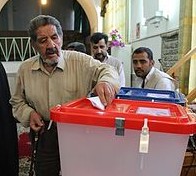Iran’s ‘Elections’ Were a Total Fraud
 by Reza Parchizadeh
by Reza Parchizadeh
The Islamic Republic of Iran held two “elections” simultaneously on February 26, 2016: Parliamentary elections, and elections for the Assembly of Experts.
According to Iranian state media and some Western media outlets, the coalition of “Moderate/Reformist” candidates, headed by Ali Akbar Hashemi Rafsanjani and Hassan Rouhani, won those elections by a landslide.
The truth is that these elections were completely fraudulent. These elections, like all elections in Iran, were heavily “engineered.” This engineering was conducted on three levels: 1) pre-election vetting of candidates; 2) sorting of candidates during the voting; and 3) announcement of the popular turnout.
Most importantly, election officials have no power in Iran. Instead, the real power is concentrated in the hands of the Supreme Leader, his political faction, and the Revolutionary Guard. All the same, even if we regard the Parliament as a genuine institution with real power, the Hashemi/Rouhani faction has only obtained a small fraction of its seats.
The same holds true for the Assembly of Experts. Much has been advertised about the role and power of the Assembly of Experts in electing the next Supreme Leader. However, historical precedent indicates that the issue of “electing” the Supreme Leader is typically settled out of the Assembly, and only announced there.
To clarify, the Assembly of Experts has only once in its lifetime announced the Next Supreme Leader. It happened on June 4, 1989, after Ayatollah Khomeini’s death. The Grand Ayatollah Ali Meshkini (1922–2007) was head of the Assembly back then. However, on the most historic day in the life of this body, Meshkini was somehow absent due to some “indisposition.”
As a result, it was Ali Akbar Hashemi Rafsanjani, then Speaker of Parliament and one of the two most powerful allies of Ali Khamenei — besides Khomeni’s son, Ahmad — who, in an act blatantly overriding his jurisdiction as Speaker of Parliament, chaired the Assembly of Experts and directed its vote in favor of Khamenei’s leadership. Meshkini was obviously against Khamenei’s leadership back then.
Therefore, even if the Hashemi/Rouhani faction got to the Assembly, and even if it obtained the majority — which did not happen because it had been rendered impossible in the first place — it did not mean that they would be the ones to “elect” the next Supreme Leader. That will be for the Khamenei faction and the Revolutionary Guard to decide.
As such, the whole process of these “elections” seems to have been part of a deal between the Hashemi/Rouhani faction and the Supreme Leader to mislead the West, and especially to conciliate the Obama Administration. This is crucial for keeping in place the controversial Nuclear Deal as well as newly-acquired international economic contracts. But it’s a total fraud.
 Iran Sentences Rapper Toomaj Salehi to Death Over 2022-23 Unrest
Iran Sentences Rapper Toomaj Salehi to Death Over 2022-23 Unrest Netanyahu: ‘Antisemitic Mobs Have Taken Over Leading U.S. Universities’
Netanyahu: ‘Antisemitic Mobs Have Taken Over Leading U.S. Universities’ U.S. Decides Against Sanctions on IDF’s Netzah Yehuda Battalion
U.S. Decides Against Sanctions on IDF’s Netzah Yehuda Battalion Israel Says It Is Poised to Move on Rafah
Israel Says It Is Poised to Move on Rafah Israeli Hostage Hersh Goldberg-Polin Seen Alive in a New Hamas Video
Israeli Hostage Hersh Goldberg-Polin Seen Alive in a New Hamas Video Palestinian Prime Minister Announces New Reform Package
Palestinian Prime Minister Announces New Reform Package France: Man Suspected of Abducting, Raping Jewish Woman ‘to Avenge Palestine’
France: Man Suspected of Abducting, Raping Jewish Woman ‘to Avenge Palestine’ Israel Intensifies Strikes Across Gaza, Orders New Evacuations in North
Israel Intensifies Strikes Across Gaza, Orders New Evacuations in North Iran Threatens to Annihilate Israel Should It Launch a Major Attack
Iran Threatens to Annihilate Israel Should It Launch a Major Attack ‘Completely Baseless’: Reports of Mass Graves at Gaza Hospitals are False, IDF Says
‘Completely Baseless’: Reports of Mass Graves at Gaza Hospitals are False, IDF Says




 Israeli Hostage Hersh Goldberg-Polin Seen Alive in a New Hamas Video
Israeli Hostage Hersh Goldberg-Polin Seen Alive in a New Hamas Video Israel Says It Is Poised to Move on Rafah
Israel Says It Is Poised to Move on Rafah U.S. Decides Against Sanctions on IDF’s Netzah Yehuda Battalion
U.S. Decides Against Sanctions on IDF’s Netzah Yehuda Battalion Netanyahu: ‘Antisemitic Mobs Have Taken Over Leading U.S. Universities’
Netanyahu: ‘Antisemitic Mobs Have Taken Over Leading U.S. Universities’ Iran Sentences Rapper Toomaj Salehi to Death Over 2022-23 Unrest
Iran Sentences Rapper Toomaj Salehi to Death Over 2022-23 Unrest